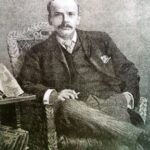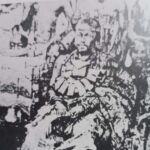RASSIN, ALIMAMY
- 4 Min Read
Alimamy Rassin (circa 1825-1890), chief of Mafonda, was that rarity among leaders, a resolute champion of peace. Remarkable in any age, his opposition to violence was all the more outstanding in 19th-century Sierra Leone, where warrior chiefs were the norm.

PHOTO CAPTION: Alimamy Rassin. SOURCE: sierra leone org.
He was born in Mafonda in what is now the Sanda Magbolonto chiefdom, Bombali district, in about 1825. He was the son of a Bunduka Fula from the Futa Toro district of Senegal, named Samba Jombor, and a Temne woman named Memuna Conteh. He was brought up in the home of his cousin, Alimamy Ahmadu, chief of Mafonda since his restless father had left the country before his birth.
Alimamy Ahmadu instilled in the boy a total aversion to war in an age when violent conflicts were common. Rassin did well in the local Islamic school. He was a gifted pupil whose intelligence impressed both his teachers and fellow pupils. News of the child prodigy spread all over Sierra Leone and beyond, and there were frequent emissaries from Senegal seeking to take him back to the ancestral homeland of the Bunduka. Ahmadu, however, refused to part with the boy, who had come to regard him as his real father.
Over the years Rassin won the respect of the citizens of Mafonda, and when Alimamy Ahmad died about 1845 he was the obvious choice to succeed him. But Rassin would not accept the honour immediately, and for 12 years following Ahmadu’s death, he remained the uninstalled chief of Mafonda. Meanwhile, in accordance with the Bunduka practise of expressing solidarity with the largely non-Muslim people of neighbouring territories, Rassin married Adama Bomboh of Sanda Tenraran, in the Bombali district of what is now the Northern Province, and Ya Dankay, daughter of his uncle, Pa Bassi Conteh of Safroko Temne.
By 1857 the succession could be delayed no longer and Rassin was made chief without serious opposition. From the outset of his rule, he made clear his hatred for war and any other form of violence and set up a fund for the promotion of peace. Under the direction of the treasurer, Pa Santigie Bokari Kamara, this fund was replenished from fines levied in the chief’s court. No price was too high for Rassin to pay in order to secure peace in troubled areas.
He mediated successfully in political disputes in Sanda Tenraran, Tonko Limba, Yoni, and Bombali Temne territories, and on occasions would send his sons, especially his favourite, Samba, on such peace missions. By 1885 the forces of the Mandinka emperor Samori had attacked the people of northern Sierra Leone, and several of his leading warriors had taken control of settlements in Koranko, Limba, and Temne country. But on reaching Mafonda the invaders were so impressed with the chiefdom’s development under Rassin that they withdrew without causing much trouble. The colonial administration in Freetown, equally impressed by Rassin’s moves to secure peace in the hinterland, offered him an annual stipend of 2,000 iron bars (a type of currency, one bar being equal to one shilling in the late 19th century). Rassin rejected the offer on the grounds that it was unethical to receive payment for the promotion of peace.
He was also a vigorous promoter of Islam in his chiefdom, and as a true believer did not hide his contempt for non-Muslims, especially those who held to traditional African religions. Like all leading chiefs of the 19th century, he had a large number of slaves whom he kept at a settlement called Miliki, where they engaged in the cultivation of the oil palm, among other things. Their condition was tolerable, and they seldom changed hands once they had become Rassin’s property.
His grandson, Ahmadu Wurie, once claimed that had Rassin been alive in 1898 he would have averted the confrontation between Bai Bureh and the British during the Hut Tax War. But Rassin died several years earlier in 1890, aged about 65, after a glorious reign of 33 years.
E. AMADU TURAY





